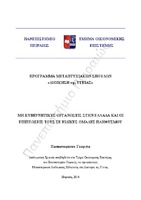Μη κυβερνητικές οργανώσεις στην Ελλάδα και οι επιπτώσεις τους σε ειδικές ομάδες πληθυσμού
Non-governmental organizations in Greece and their impact in special groups

View/
Subject
Μη κυβερνητικές οργανώσεις -- Ελλάδα ; Κοινωνική πολιτική ; Non -- governmental organizations -- Greece ; Social policyAbstract
In today's social reality, Non-Governmental Organizations (NGOs) are considered as effective and key players in the provision of social services. This perception prevails even among social workers that serve in the public sector. The latter, in their effort to find a solution to the needs of society, guide people in need to seek help from NGOs. In this way, they shift social responsibility and care from the public domain to NGOs. Make them so look as if NGOs are the only institutions that can respond effectively and immediately to important issues people face such as housing, food and healthcare. The increasing power of NGOs, versus public social services is, confirmed by the study of Gianakoulli and Lalloudaki (2006). According to their findings Non-governmental organizations can operate in an environment of uncertainty and instability, drawing power from volunteerism. They also act with more flexibility and freedom than public bodies thus covering gaps that public social services are not able to provide. Under the Greek unstable environment, NGOs face the challenge for their survival and the ability to provide decent, unimpaired, yet social responsible aid to the people in need. In this dissertation it is examined the ability of Greek NGOs to provide effective assistance to the disadvantaged groups of people, taking into account the growing number of people that address social aid. It is also explored the degree to which NGOs respect the personality of those applying for help. The reason for this exploration is the sense that the participants in such initiatives are not looking just for covering material needs but also dignity, self-esteem, and solutions to various psychosomatic problems they develop due to their poverty.


